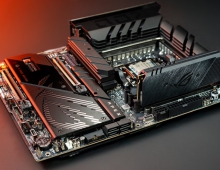
AMD Bolsters Embedded Portfolio with New Ryzen Embedded 5000 Series Processors for Networking Solutions
AMD announced the availability of its high-performance AMD Ryzen™ Embedded 5000 Series, a new solution for customers requiring power-efficient processors optimized for “always on” networking firewalls, network-attached storage systems and other security applications. The Ryzen Embedded 5000 Series rounds out the “Zen 3”-based AMD embedded processor portfolio which also includes the Ryzen Embedded V3000 and EPYC™ Embedded 7000 series families.
Built on 7nm technology with planned five-year manufacturing availability, and equipped with 6, 8, 12 or 16 cores and 24 lanes of PCIe® Gen4 connectivity, Ryzen Embedded 5000 Series processors are designed for enterprise reliability to support the consistent uptime requirements needed by security and networking customers. Ryzen Embedded 5000 Series processors include robust reliability, availability and serviceability (RAS) features, including an ECC-supported memory subsystem. With a thermal design power (TDP) profile ranging from 65W to 105W, Ryzen Embedded 5000 processors enable the reduction of overall system cooling footprint for space-constrained and cost-sensitive applications.
“Ryzen Embedded 5000 processors deliver the ideal combination of performance and reliability required for 24x7 security and networking applications,” said Rajneesh Gaur, corporate vice president & general manager, Embedded Solutions Group, AMD. “This expansion of our embedded product portfolio offers a mid-range solution that fills the gap between our low-power BGA Ryzen Embedded and our world-class EPYC embedded family for customers requiring both high performance and scalability of up to 16 cores.”
“AMD’s success in the embedded market is built on offering differentiated and scalable offerings that address a wide range of applications with different power, performance and environmental requirements,” said Kevin Krewell, principal analyst at TIRIAS Research. “The AMD Ryzen Embedded 5000 strikes an optimal balance of power and performance for applications ranging from small-form factor embedded systems to storage, security, and networking systems, suiting the broadest range of customers and use cases.”
Ryzen Embedded 5000 Series processors offer:
- Scalability up to 16 cores and 32 threads
- Up to 64MB of shared L3 CPU Cache
- Energy efficient TDP from 65W to 105W
- ECC-supported memory and security features
- 24 lanes of PCIe® 4 connectivity (expandable I/O up to 36 lanes with AMD X570 chipset)
- Optimized performance for enterprise reliability
Ryzen Embedded 5000 Series Processor Product Chart
| Model | CPU Cores | Threads count | CPU Base Freq (GHz) | CPU 1T Boost Freq (up to GHz1) | L3 CPU Cache (MB) | Nominal TDP (W) | DDR4 Channels | Max DDR4 rate (MT/s) (1DPC) | PCIe® Gen 43 Lanes | Socket |
| 5950E | 16 | 32 | 3.05 | 3.4 | 64 | 105 | 2 | 3200 | 24 | AM4 |
| 5900E | 12 | 24 | 3.35 | 3.7 | 64 | 105 | 2 | 3200 | 24 | AM4 |
| 5800E | 8 | 16 | 3.4 | 3.7 | 32 | 1002 | 2 | 3200 | 24 | AM4 |
| 5600E | 6 | 12 | 3.3 | 3.6 | 32 | 65 | 2 | 3200 | 24 | AM4 |
1Max boost for Ryzen Embedded 5000 processors is the maximum frequency achievable by any single core on the processor under normal operating conditions for enterprise systems.
2Ryzen Embedded 5800E processor supports configurable Thermal Design Power (cTDP) from 65W to 100W.
3Ryzen Embedded 5000 processors support a total of 24 lanes of PCIe® Gen4. Optionally paired with the AMD X570 Chipset, up to 36 lanes of PCIe® Gen4 can be supported.
AMD Ryzen Embedded 5000 Series processors are currently in production with five-year planned manufacturing availability.





















